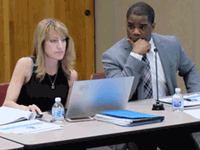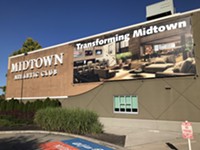[
{
"name": "500x250 Ad",
"insertPoint": "5",
"component": "15667920",
"parentWrapperClass": "",
"requiredCountToDisplay": "1"
}
]
This month, as you may have heard, Louisville, Kentucky, leaped from 67th to 16th on the list of the largest cities in the US.
Well, it wasn't exactly one fell swoop; the jump --- which happened because the city and county governments merged --- was the result of an election in 2000. Which was the result of intensive, highly professional campaigning. Which followed three previous elections, dating back to 1956, in which voters defeated merger proposals.
Now Louisville has joined the big time. It is, of course, still Louisville. People still live in the same neighborhoods they lived in before. But B. Riggs Lewis, a Louisvillian who visited Rochester last week, is convinced the merger will make a difference. Will give Louisville clout. Will move the region forward. Will spur economic development.
Lewis, as an official of Louisville's Chamber of Commerce, worked on the Unity campaign that led to the 2000 merger vote. (His Rochester talk, outlining Louisville's road to metro, was sponsored by the Downtown Community Forum of St. Mary's Church, the Common Good Planning Center, and the League of Women Voters.)
Louisville-Jefferson County and Rochester-Monroe have a good bit in common. Both cities are heavily Democratic. Both counties, outside their cities, vote Republican. Political squabbling between city and county has been common and is blamed for the communities' lack of progress. (During the Unity campaign, said Lewis, the Louisville Courier-Journal ran an editorial cartoon showing a tandem bike, one piece headed in one direction, the other in the opposite.)
In Louisville-Jefferson County, there was stagnation. And malaise. An attitude that the community couldn't get anything done. "We were a defeated city," said Lewis.
Obviously, it's too early to tell whether Louisville will now be able to get things done. But, said Lewis, the merger "has given us a sense of purpose, a vision." And the experience of other metropolitan governments (Nashville, Indianapolis, and Toronto, for instance) is that things do happen.
Does Louisville offer any lessons for Rochester? Despite the similarities, the two counties aren't completely alike. In some areas, Louisville-Jefferson was ahead of us before the merger (or not, depending on your feelings about metro).
The city and county had already agreed on the importance of a single economic-development effort, and together had contracted out that responsibility to the Chamber of Commerce. The city and county school districts merged 30 years ago. Land-use planning was handled on a countywide basis prior to the city-county merger.
Still, the idea of a single city-county government had not been overwhelmingly popular. Many elected officials had fought it. Louisville's African-American leaders worried about losing minority representation on the new county council.
A 1956 merger proposal was trounced at the polls: City residents supported it 60 to 40 percent, but suburban and rural residents defeated it 72 to 28 percent. A 1982 proposal lost narrowly, 50.4 to 49.6 percent. But a proposal the next year lost by a bit more: 51.5 to 48.5 percent.
The issue was drainingly divisive, Lewis said. But it didn't die. By the late 1990s, more and more community leaders and activists were convinced that only a major change could turn the region around. And the business community stepped forward, contributing heavily to the $1.5 million Unity campaign. US Senator Mitch McConnell helped lead the campaign.
"The business community came," said Lewis, "because it was our last chance."
Business leaders in Greater Rochester continue to be silent --- although it was no small thing that last week's audience included Tom Mooney, CEO of the Rochester Business Alliance (the merged Chamber of Commerce and Industrial Management Council).
Mooney has had a highly publicized break with the most adamant of local metro opponents, County Executive Jack Doyle. The issue, apparently, was Doyle's management style. But Mooney and other business leaders are quite obviously worried: A region that was once dynamic, growing, and innovative, attracting talent from throughout the country, is in decline, and nothing seems to be working to reverse it.
Some of us think some form of metro government offers hope. But in Rochester-Monroe, regionalism is considered a political issue. Flaky liberal Democrats favor it. The Republicans who talk about it hate it.
In some other areas of the country, Republicans have embraced regionalism. Louisville's merger was the result of a broad, bipartisan effort; Unity leader Mitch McConnell is a Republican, as is Lewis.
And there's another lesson: There's no one, single form of "merger." "Before we talk about merger," Lewis said as he opened his Rochester talk, "drop your concepts." Communities can develop mergers in a variety of ways.
Louisville's merger combined city and county governments into one. It did not affect the governments of the numerous --- 90! --- little incorporated "cities" in Jefferson County. Some of them consist of only 500 homes, with no commercial center.
In metro Louisville, those little neighborhoods are still individual, incorporated municipalities, with their own zoning regulations and whatever. If residents want to keep paying the costs of running their own little government, they can do so. If they want to be incorporated into Louisville, they can do that, too. It's up to them.
The point is, there's no one "right" kind of metropolitan government. Rochester-Monroe could create whatever it wanted. The important thing is to look at what's standing in the way of progress. It makes no sense to let housing and commercial development eat up valuable open space out in the country while buildings and land stand abandoned in the city and older suburbs. Having the city and its suburbs fight over development is just nuts.
For years, we've tried to move forward as a group of separate little municipalities. We've lost businesses. We've lost talented young people. We've lost open space. We've squandered opportunities. Some communities have found other ways to govern. We could, too.
Can't we at least talk about that?
Want to comment? Write
Speaking of...
Latest in Columns
More by Mary Anna Towler
-

Police reform: advocates on what should come next
Oct 22, 2019 -

Court clears the way for Police Accountability referendum
Oct 17, 2019 -

Dade outlines initial actions on district deficit
Oct 9, 2019 - More »








